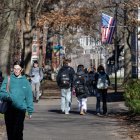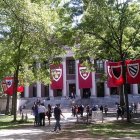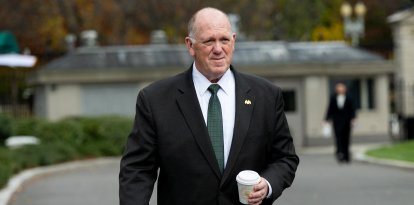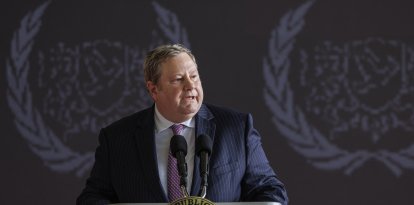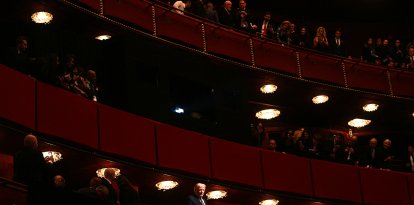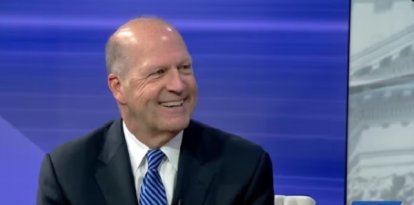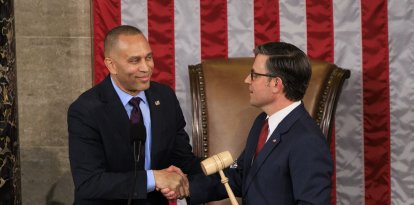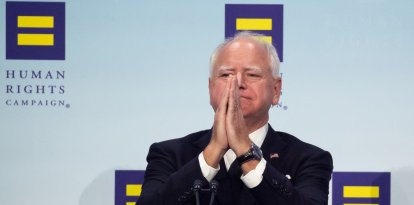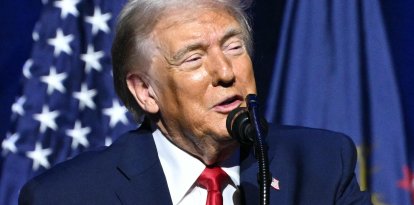Harvard’s president, following reports of antisemitism and Islamophobia, apologizes, says the university ‘cannot — and will not — abide bigotry'
Harvard President Alan Garber, who took office in January 2024, apologized for the revealed problems. "The 2023-24 academic year was disappointing and painful," he wrote.

Students stroll through Harvard University (Archive).
Harvard University published two comprehensive reports Tuesday, revealing serious problems of antisemitism and anti-Arab, anti-Muslim and anti-Palestinian bias on its campus.
The documents, which total hundreds of pages, come at a critical time for the institution, which is facing an investigation by the Trump administration over allegations of antisemitism while also suing the same administration over the withdrawal of billions of dollars in federal funds.
The report on antisemitism, prepared by a task force composed primarily of faculty, students and the former director of Hillel, concluded that this type of discrimination has infiltrated courses, social life, the hiring of some faculty and the outlook for certain academic programs, especially in areas such as the graduate school of Education, the school of Theology and the school of Public Health.
The document notes that incidents of antisemitism, present before the Hamas attack against Israel in 2023, intensified after the war in Gaza. Among the episodes cited were a case in which an instructor allowed a student to avoid working with an Israeli classmate because he was seen as supporting an "oppressor group," and another in which students shouted "Free Palestine" during a welcoming event at the medical school.
For its part, the report on anti-Arab, anti-Muslim and anti-Palestinian prejudice, based on hundreds of conversations with students, staff and faculty, described a widespread feeling of "abandoned and silenced” among these communities.
Figures
92% of Muslims surveyed said they feared academic or professional sanctions for expressing their political views. Palestinian students reported feeling insulted with terms such as "terrorist" or "towelhead" for wearing kaffiyeh. They also lamented the lack of institutional support as they mourned the loss of loved ones in Gaza.
Pro-Palestinian professors expressed concern about the scrutiny of their classes and the restriction of academic freedom.
A survey conducted by both task forces, with nearly 2,300 responses, revealed that 47% of Muslim students, 15% of Jews and 6% of Christians reported feeling physically unsafe on campus.
In addition, 92% of Muslims, 61% of Jews and 51% of Christians feared expressing their political opinions. The reports, which did not verify the reported experiences, highlighted polarization on campus, exacerbated by protests and counter-protests over the war in Gaza.
Harvard's response
In a letter accompanying the reports, Harvard's President Alan Garber, who took office in January 2024, apologized for the problems revealed. "The 2023-24 academic year was disappointing and painful,” he wrote, lamenting the times when the university failed to meet the expectations of its community.
Garber asserted that “Harvard cannot — and will not — abide bigotry” and promised concrete actions, such as reviewing admissions policies, appointments, curricula and training programs, as well as promoting diversity of viewpoints, according to notes from the New York Times.
Garber's promises partially match the demands of the Trump administration, which on April 11 demanded reforms in Harvard's merit-based hiring and admissions, as well as external audits to assess the diversity of opinion and sanctions against professors who discriminate against Jewish students or incite protests contrary to campus norms.
These demands, which Harvard considered a violation of academic freedom, have escalated tensions with the Republican administration, which also withdrew federal funds from the university. Harvard, the first institution to sue the Trump administration to recover that funding, is being closely watched by other affected universities.

Society
Elite universities form shadow collective to counter Trump administration
Emmanuel Alejandro Rondón





